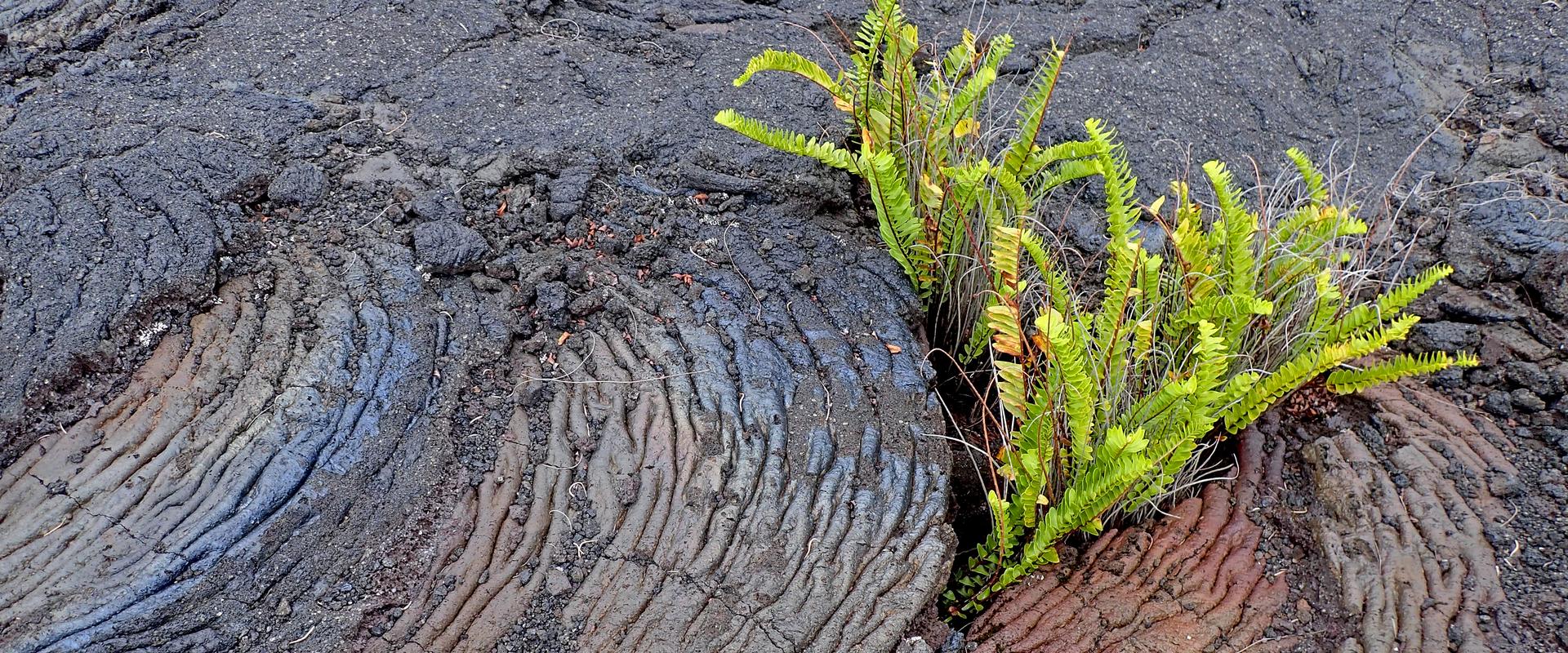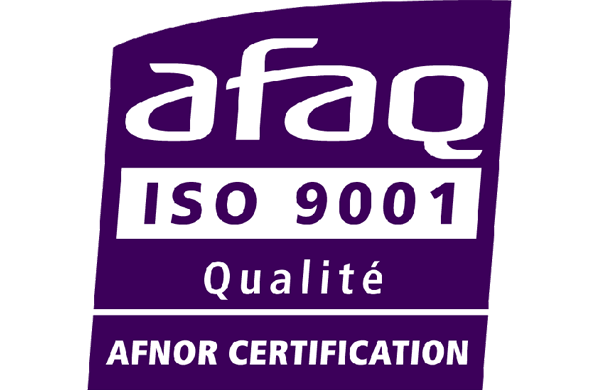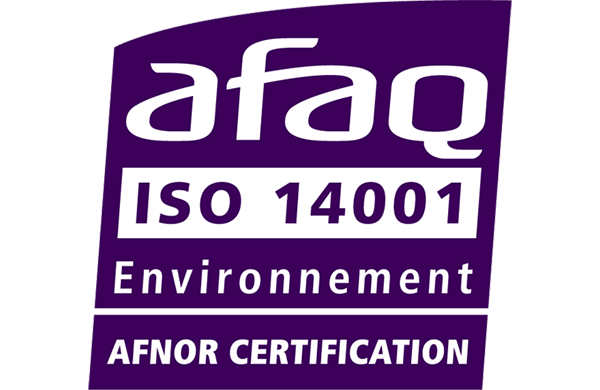From the outset, BRGM has endeavoured to comply with a professional code of ethics recognised by all its stakeholders. It now has a system and a Code of Ethics that define the main ethical principles and thus provide its staff with guidelines for honest and responsible decision-making on a daily basis.
As a major player in sustainable development and a signatory to the Sustainable Development Charter for public institutions and public enterprises, the public establishment is committed to a global CSR approach.
As a public research and expertise establishment, BRGM also contributes to the science-society dialogue in its various fields of activity, by providing information for decision-makers and organising public outreach meetings with representatives of civil society.
Finally, committed to the satisfaction of its customers and partners, BRGM is ISO 9001 (quality) and ISO 14001 (environment) certified. BRGM's laboratories are accredited by COFRAC, the French accreditation body.

Professional ethics at the BRGM
Since its creation, the BRGM has endeavoured to abide by a code of ethics acknowledged by all interested parties. This commitment is a driving force of the BRGM's culture, and this is why it has now been transcribed into a Code of Ethics that explicitly sets out the principles adhered to by all BRGM employees.
Since 2018, the BRGM has been a signatory of the national charter of ethics of research professions.
The BRGM's ethics system
Since 2014, the BRGM has gradually implemented an ethics system that includes:
- A project manager appointed specifically to develop and implement the ethics system. A particular aim is to promote, among all employees, full awareness of the importance of integrity and responsibility in professional conduct in all areas and to help our organisation address any work situations that could raise professional ethics issues.
- An external professional ethics committee to provide the BRGM with critical insights on the design and implementation of its code of ethics and on its handling of cases involving professional ethics.
- Case files on ethics questions raised by employees, specifically addressed by the Ethics project manager and subsequently validated by the hierarchy.
- A Code of Ethics developed through a collaborative approach with about one hundred people representing the different specialisations, qualifications and generations of BRGM staff members.
BRGM's Code of Ethics : 5 fundamental principles
The BRGM's Code of Ethics is based on the five fundamental principles that underpin the conduct by all employees of their professional activities, guided by a constant awareness of their contribution to the exercise of the BRGM's corporate social responsibility.
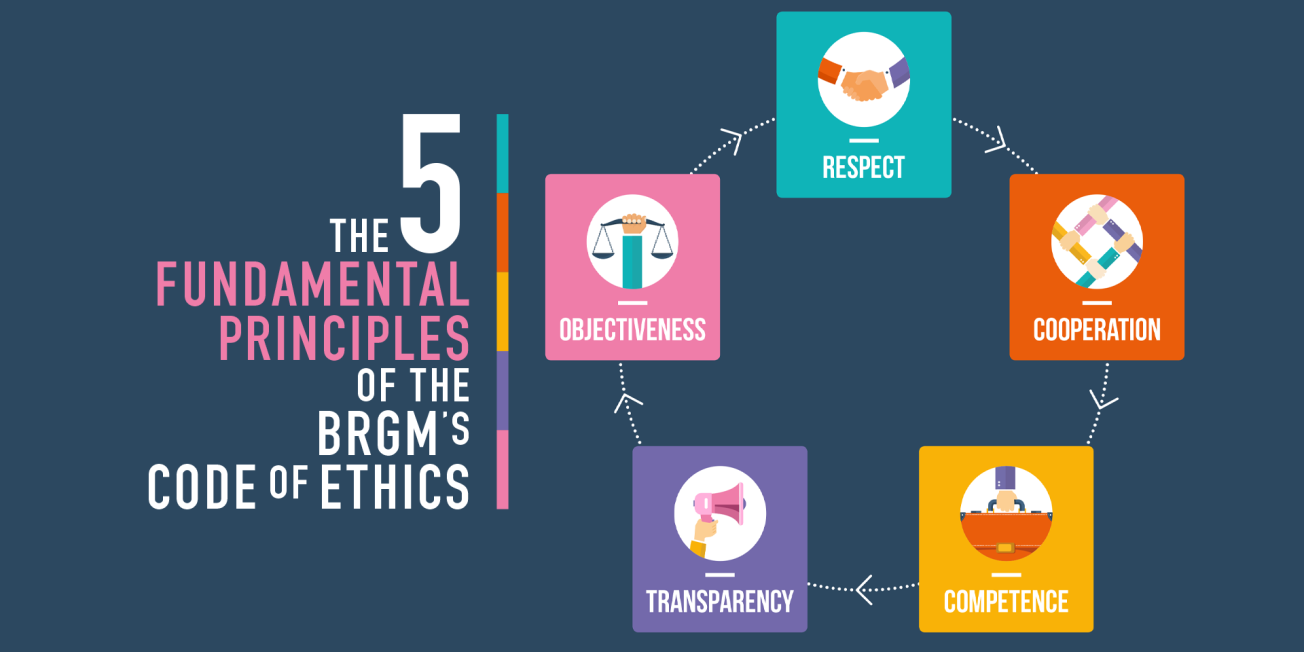
BRGM’s Code of Ethics.
© BRGM
Respect
Integrity / Loyalty / Probity
By virtue of its specialisations and activities, the BRGM is by definition a player in sustainable development. It conducts its activities with integrity, abiding by its undertakings, with respect for people, property and the environment and in compliance with regulations.
Cooperation
Dialogue / Attentiveness / Mutual assistance
The strength of the BRGM lies in its capacity for dialogue and attentiveness to each and every one of the widely diverse interested parties it works with prior to harnessing its multidisciplinary competences to undertake the research and expert study projects entrusted to it.
Competence
Reliability / Professionalism / Thoroughness
The BRGM's competence rests on its capacity for harnessing the combined strengths of its scientific disciplines and fields of expertise and capitalising on the wealth of its scientific heritage of data, technologies and knowledge accumulated over nearly 60 years. This competence is expressed by the guaranteed thoroughness and integrity of its scientific approach and by the quality of results produced in compliance with both deadlines and budgets.
Transparency
Communication / Disclosure of interests / Freedom of expression
The BRGM discloses all affiliations it may have with interested parties and endeavours to share all scientific knowledge produced with public funding. It reports all uncertainties, knowledge gaps and controversies that may arise from these affiliations. It develops objective, verifiable, open and accessible communication materials on its scientific and technical work.
Objectiveness
Impartiality / Independence / Neutrality
The BRGM conducts its tasks independently of any particular political, economic or commercial interests.

Corporate social and environmental responsibility (CSR)
As a signatory of the Sustainable Development Charter for public institutions and public enterprises, with ISO 9001 certification since 2004 and ISO 14001 since 2012, the BRGM is strongly committed to the environment through the CSR actions it has been implementing for several years.
As a national public operator and through its functions in targeted geoscience research, the BRGM addresses numerous issues in connection with economic activities and sustainability. Its activities and commitments are deployed at the national level through its work as the French Geological Survey, as well as regionally, in Europe and internationally.
Sustainable development: the central goal of the BRGM and its teams
The BRGM's key roles are driven by collective needs and issues requiring knowledge and support for decision-making on environmental, economic and social questions involving subsoils, their resources and the associated risks.
Eco-responsible behaviour, eco-mobility, waste sorting, energy-efficient renovation of its premises, indicators and emissions reporting are all part of the drive to maintain and reinforce consistency, both internally and externally, between the BRGM's scientific activities and good practice among its employees.
Review of CSR action at the BRGM
The BRGM has produced a review of action taken in recent years in the field of corporate social and environmental responsibility (CSR). Examples from our core fields of activity and from our day-to-day operation highlight the BRGM's CSR commitments to each of the pillars of corporate social and environmental responsibility: good governance and social, environmental and economic sustainability.
The 4 pillars of corporate social and environmental responsibility at the BRGM
BRGM action on corporate social and environmental responsibility is organised into 4 main areas: BRGM governance, social responsibility, environmental responsibility and involvement in the economy.
These 4 areas are defined in accordance with the Principles and Guidelines for CSR in public organisations, published by the Ministry for Sustainable Development with the Public Organisations and Enterprises Sustainable Development Club.
BRGM governance
Governance at BRGM rests on several bodies, in particular the Board of Administration and the Board of Directors, which work with the various BRGM stakeholders – supervisory ministries, partners, clients and employees –- and involve its workforce in important CSR decisions through the works committee, staff representatives and the CSSCT.
BRGM social commitments
BRGM's goal is to promote professional development, mobility, motivation and advancement for all employees. This social commitment is laid down in a human resources policy based on training (internal and external), on agreements relating to the management of jobs and career paths (GEPP), teleworking, profit-sharing, professional equality, disabilities and vigilance with regard to psycho-social risks.
The BRGM's commitment to eco-responsibility and the environment
This commitment is integral to the BRGM's corporate culture. As well as awareness campaigns on eco-behaviour, waste sorting and eco-mobility, the BRGM has launched a programme to improve energy-efficiency and sustainability in its premises in the medium term.
BRGM commitments to the economy
Through its agencies covering mainland and overseas France, the BRGM applies a policy for close working relationships with each region's public authorities and enterprises, in order to support sustainable and responsible management of all below-ground environments and their resources.

HR commitments

Opening up to society
Society is raising more and more questions about soils, subsoils and their resources: resource uses and management, environmental practice and heritage management, preventing risks to people and property, conflicts between uses, etc.
The BRGM conducts expert studies to support informed policy decisions and organises meetings for exchanges with civil society representatives.
Establishing a dialogue with NGO representatives
With this approach, the BRGM is looking to share available scientific knowledge to encourage discussions over questions and uncertainties in order to better understand the needs and expectations of citizens relayed by environmental NGOs.
Through its commitment to dialogue with representatives of environmental NGOs, the BRGM is aiming to:
- build up a common understanding of social concerns and complex social issues relating to the environment (water, resources, etc.);
- build up a reservoir of mutual knowledge, respect and trust;
- present the results of its research, studies and expert assessments in a manner that is understandable to all and therefore shareable;
- discuss questions of concern to the environmental NGOs represented;
- strengthen the credibility of the BRGM's research and expert studies;
- enhance the quality of its responses to public and private decision-makers;
- strengthen the contributions of the BRGM's R&D roadmap to the dialogue between science and society.
Regional meetings
Environmental NGOs conduct their activities with the help of permanent staff and volunteers who thus acquire particular expertise on issues in their regions. The BRGM's regional representatives organise meetings with representatives of civil society groups to discuss environmental questions that come within the BRGM's areas of expertise and on which papers and articles have been published.
These meetings provide opportunities for open and constructive discussions by encouraging exchanges of knowledge - or knowledge "gaps", questions from all parties and expressions of their expectations, while observing the ethical principles that guarantee transparency and trust and preserve the independent judgement of all concerned.
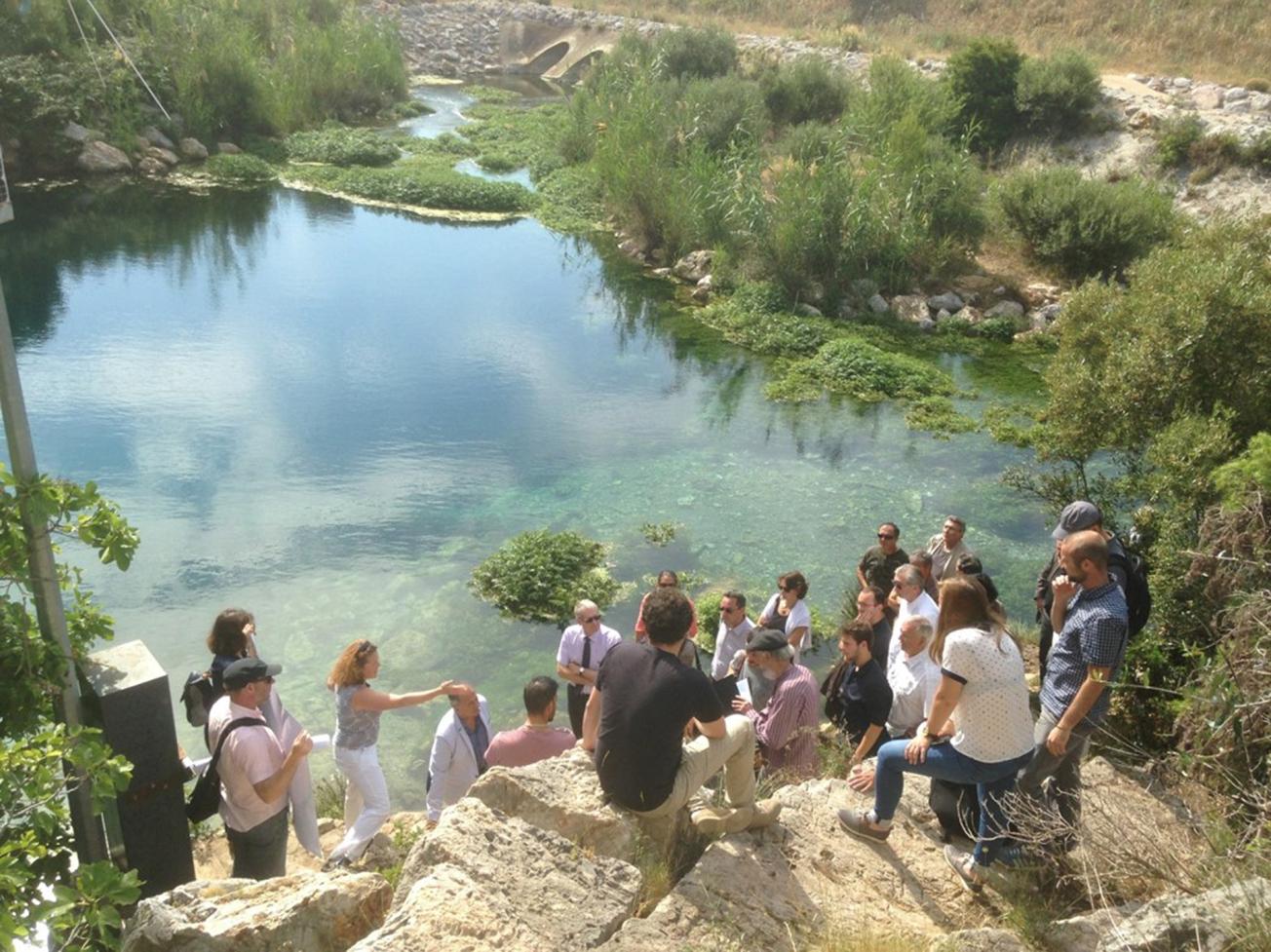
Meeting “Opening BRGM to society” of 1 June 2017 in Perpignan.
© BRGM
A dialogue between science and society that feeds into the BRGM's scientific programmes
As an independent public institution, the BRGM deploys its expert knowledge to seek environmentally sustainable solutions in response to requests from public and private decision-makers. The BRGM's expertise evolves continually with the regular renewal of its R&D programmes, which in turn reflect issues and questions that emerge from the BRGM's meetings with civil society representatives.
As of 2017, points of discussion that repeatedly emerge from the BRGM's meetings with civil society groups will be taken into account in the development of its scientific programmes.
To meet needs for the information and explanations that are essential to constructive thinking among citizens, professionals and decision-makers, the BRGM publishes the results of its scientific studies that relate directly to issues of concern to society.
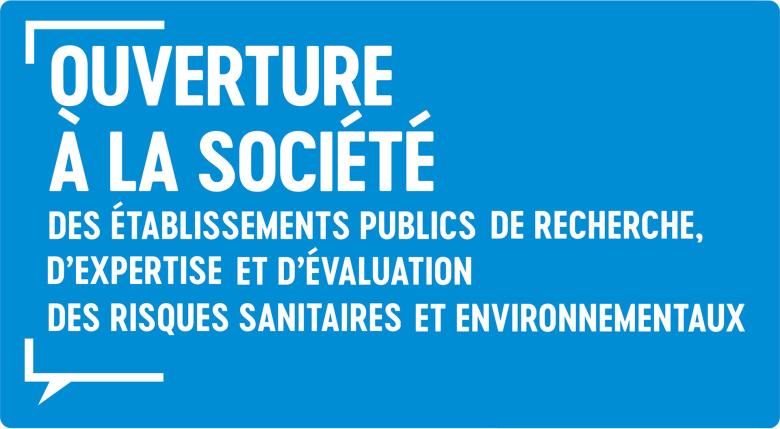
Charter for opening up public research, expertise and health and environmental risk assessment bodies to society
© République française
BRGM signatory to the charter for opening up to society
BRGM is one of the signatories of the Charter for opening up public research, expertise and health and environmental risk assessment bodies to society.
All the signatory public establishments, however diverse, fulfill a mission of common general interest: assessing health and environmental risks and ways of reducing them, with a view to providing decision-making support.
By signing the charter, they affirm or reaffirm their common desire for dialogue with civil society actors in the context of their expertise and/or research activities.

Quality and environmental responsibility
Quality: ISO 9001 certification
BRGM has been certified ISO 9001 - Quality Management System since 2004 for all its activities and for all its locations, in France and abroad.
This certification, which is renewed every three years, reflects the high priority given at BRGM to satisfaction from its clients and partners (public organisations and enterprises).
Environmental responsibility: ISO 14001 certification
BRGM is certified ISO 14001 - environmental management system.
This certification guarantees the BRGM’s environmental accountability for:
- effectively managing the impacts of its Orleans site and its field interventions, in compliance with environmental regulations,
- preventing pollution,
- reducing consumption that has direct impacts on natural resources.
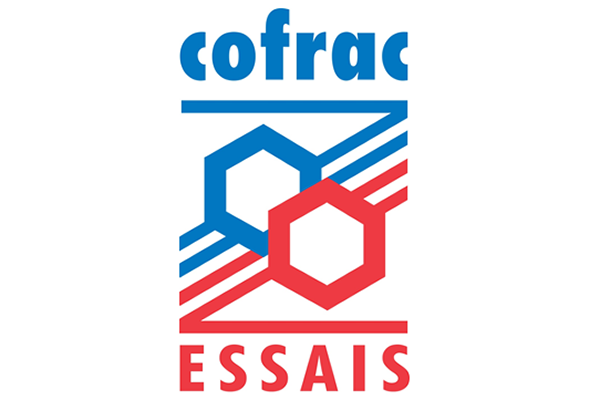
COFRAC logo. Accreditation no. 1-0251 available on www.cofrac.fr.
© COFRAC
COFRAC accreditation of BRGM’s laboratories
BRGM’s analytical laboratories have been accredited by COFRAC (the French accreditation body) since 1994 (Laboratories section - Testing Sector), in compliance with the NF EN ISO/CEI 17025 standard for “general requirements concerning the competence of calibration and testing laboratories”.
This accreditation covers:
- physico-chemical water analyses,
- analyses of soils in relation to the environment,
- analyses of sediments,
- development and adaptation of analysis methods
COFRAC accreditation is an important mark of recognition of BRGM’s technical and organisational competence and underlines its performance.
It is also a guarantee of the reliability of BRGM laboratory results and of their independence and impartiality, thus ensuring the comparability of analyses at the European and international levels.
Finally, COFRAC accreditation recognises BRGM’s capacities for developing innovative methods in the field of metrology.
The BRGM’s laboratories are audited by COFRAC every year to ensure that its technical and organisational competence is being maintained. Accreditation comes up for renewal every five years.

